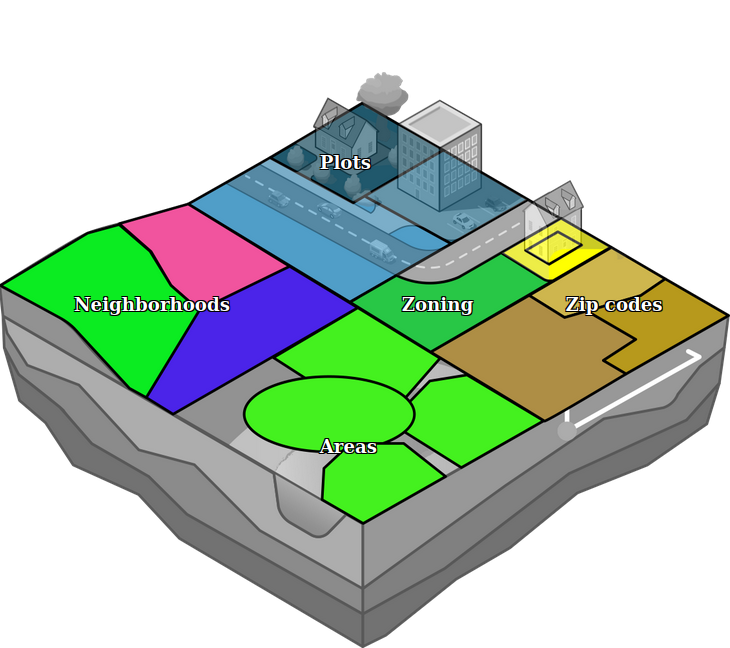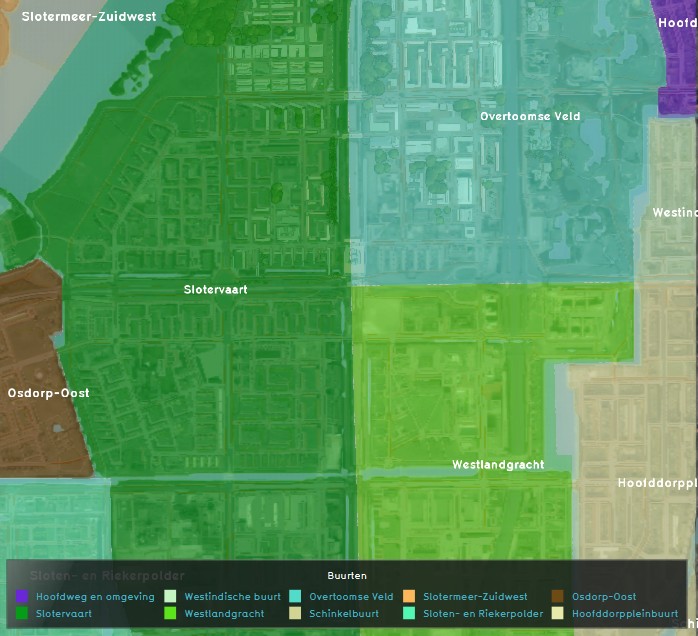Neighborhood: Difference between revisions
No edit summary |
No edit summary |
||
| (20 intermediate revisions by 2 users not shown) | |||
| Line 1: | Line 1: | ||
[[File: | [[File:Api_current_situation_urban_subdiv.png|thumb|right|400px|[[Neighborhood]] in comparison to [[Area]]s, [[Zone]]s and [[Plot]]s]] | ||
Neighborhoods in the {{software}} are mutual exclusive spatial areas that divide a city | Neighborhoods in the {{software}} are mutual exclusive spatial areas that divide a city or village. These areas do not overlap and are, when available, based on real (historical) data. For projects situated in the Netherlands, this data is retrieved from CBS at the level of neighborhoods ("buurten"), as opposed to the larger districts ("wijken"). | ||
For [[planning | For [[planning session]]s, it is possible to direct the focus to sub-regions within your project by [[Active attribute|deactivating]] certain neighborhoods in a specific [[Scenario|scenario]]. This helps stakeholders to familiarize themselves with the {{software}} in a secluded area of the project, before progressing into the more complex spatial issues at hand. | ||
Neighborhoods can be visualized by using the [[Neighborhoods Overlay]]. | Neighborhoods can be visualized by using the [[Neighborhoods Overlay]]. | ||
[[File:neighborhoodstest1-screenshot-2016-11-02_10-16-03.jpg|thumb|left|The Neighborhoods of Amsterdam West, as visualized in the {{software}} using the [[Neighborhoods Overlay]].]] | |||
{{article end | |||
|howtos= | |||
{{ | |||
* [[How to add, remove and duplicate a Neighborhood]] | * [[How to add, remove and duplicate a Neighborhood]] | ||
* [[How to edit Neighborhood properties]] | * [[How to edit Neighborhood properties]] | ||
* [[How to (de)activate a Neighborhood per Scenario]] | * [[How to (de)activate a Neighborhood per Scenario]] | ||
* [[How to plot neighborhood demographics in a pie chart]] | |||
* [[How to use neighborhood attributes in a Combo Overlay]] | |||
|notes= | |||
* Since Neighborhoods are non-overlapping, they can be used to subdivide calculations for [[Indicator]]s. See [[X query (Excel)|X-Queries]] for more information. | |||
|seealso= | |||
* [[Scenario]] | |||
}} | |||
{{Template:Editor current situation nav}} | {{Template:Editor current situation nav}} | ||
[[Category:Items]] | [[Category:Items]][[Category:Neighborhood]] | ||
Latest revision as of 13:06, 17 October 2025

Neighborhoods in the Tygron Platform are mutual exclusive spatial areas that divide a city or village. These areas do not overlap and are, when available, based on real (historical) data. For projects situated in the Netherlands, this data is retrieved from CBS at the level of neighborhoods ("buurten"), as opposed to the larger districts ("wijken").
For planning sessions, it is possible to direct the focus to sub-regions within your project by deactivating certain neighborhoods in a specific scenario. This helps stakeholders to familiarize themselves with the Tygron Platform in a secluded area of the project, before progressing into the more complex spatial issues at hand.
Neighborhoods can be visualized by using the Neighborhoods Overlay.

Notes
- Since Neighborhoods are non-overlapping, they can be used to subdivide calculations for Indicators. See X-Queries for more information.
How-to's
- How to add, remove and duplicate a Neighborhood
- How to edit Neighborhood properties
- How to (de)activate a Neighborhood per Scenario
- How to plot neighborhood demographics in a pie chart
- How to use neighborhood attributes in a Combo Overlay